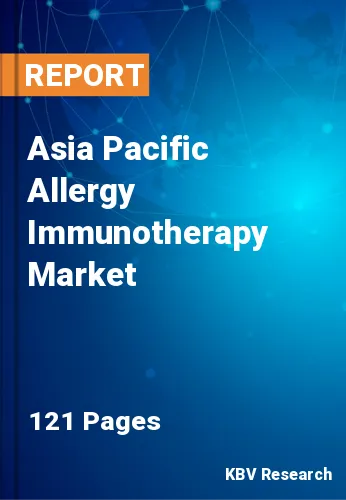The Asia Pacific Allergy Immunotherapy Market would witness market growth of 9.4% CAGR during the forecast period (2023-2030).
Recent years have seen a substantial increase in interest in the immunotherapy treatment industry because of its novel approach to cancer treatment. It's crucial to remember that an expanding sector for allergy immunotherapy uses comparable immunotherapy techniques to treat allergies. Immunotherapy for allergies differs from immunotherapy for cancer, although there are some parallels between the two. Both utilize biologics to activate an immunological response while depending on the immune system to combat disease. The success of cancer immunotherapies has also generated interest in using comparable strategies for treating other disease states, including allergies.
This market is one of the fastest-growing segments in the healthcare sector, with various variables influencing the current environment. The expanding incidence of allergies, developments in biotechnology and immunology, and the demand for individualized medication are all significant incentives. Among other things, allergy immunotherapy is a medication that stops allergic reactions from food, grass pollen, dust, and bee venom. Allergy immunotherapy aids in the reduction of allergy symptoms, particularly those that frequently lead to rhinitis, asthma, and conjunctivitis.
The National Library of Medicine reports that in China, 10.54% and 9.99% of patients, respectively, self-reported having food and medication allergies. Additionally, 20.48% of patients overreacted to insect bites. India is experiencing a fast health transition, with the rising burden of non-communicable disease (NCD) surpassing the burden of communicable disease. For the prevention and control of NCDs, many programs by the government were launched with a focus on strengthening infrastructure, human resources, early diagnosis, referral, and management. The rising cases of non-communicable diseases with the increasing government programs for their treatment will further surge the market’s growth.
The China market dominated the Asia Pacific Allergy Immunotherapy Market by Country in 2022, and would continue to be a dominant market till 2030; thereby, achieving a market value of $208.9 million by 2030. The Japan market is poised to grow at a CAGR of 8.7% during (2023 - 2030). Additionally, The India market would register a CAGR of 10.1% during (2023 - 2030).
Based on Distribution Channel, the market is segmented into Retail Pharmacy, Hospital Pharmacy, and Online Pharmacy. Based on Treatment Type, the market is segmented into Subcutaneous Immunotherapy (SCIT), and Sublingual Immunotherapy (SLIT) (Tablets, and Drops). Based on Allergy Type, the market is segmented into Allergic Rhinitis, Allergic Asthma, and Others. Based on countries, the market is segmented into China, Japan, India, South Korea, Singapore, Malaysia, and Rest of Asia Pacific.
Free Valuable Insights: The Worldwide Allergy Immunotherapy Market is Projected to reach USD 2.9 Billion by 2030, at a CAGR of 8.4%
The market research report covers the analysis of key stake holders of the market. Key companies profiled in the report include Viatris, Inc. (Mylan N.V.), Merck KGaA , NIOX Group plc , DMS Imaging SA, Adamis Pharmaceuticals Corporation, Stallergenes Greer International AG (B-Flexion), Allergy Therapeutics plc , DBV Technologies S.A., HAL Allergy B.V. (Droege International Group AG.), LETI Pharma, S.L.U.
By Distribution Channel
By Treatment Type
By Allergy Type
By Country
Our team of dedicated experts can provide you with attractive expansion opportunities for your business.

